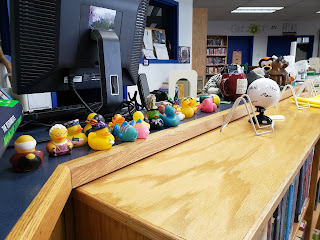Ask a Librarian: Answers You Won't Get From Google: Odds and Ends
Some questions fell through the digital cracks and I am just now getting around to answering them. Sorry, folks - too much screen time for this librarian!
Let's begin with James, who asked, "What is the weirdest place you've ever been? If you could
would you go back?"
For the longest time I thought that Columbus, Ohio was the strangest place I had ever been. No mountains, no Great Plains, and so much humidity that some summers I never felt completely dry.
People there crazy about a football team, Ohio State, whose mascot is a buckeye, which is the name of a poisonous nut from the buckeye tree. On football Saturdays, many of the crazies in attendance wore necklaces made of buckeye candy, a lethal combination of milk chocolate and peanut butter that left people well on their way to a sugar crash.
Now that I think of it, the whole Midwest is just weird. Consider the Big 10 Conference, which has 14 schools. Really. Universities that apparently can't count. And the mascots? Don't get me started. The Wisconsin Badgers and Michigan Wolverines are properly fierce mascots, but the Cornhuskers (Nebraska), Boilermakers (Purdue), Golden Gophers (Minnesota - really?!), and the Hoosiers (Indiana). Even people who grow up in Indiana don't know, for sure, what a Hoosier is. No one does.
But as weird as the Midwest is, since my time in Ohio I have discovered an even weirder place.
BIt turns out that middle school is the weirdest place I've ever been. Any middle school in any town, I imagine. Just think about what students must endure in their passage through middle school? And look what it does to middle school teachers. Two words that capture how weird middle school is? Mr. Chimo.
Would I go back, James? Back to middle school? Not as a student. Not for anything would I be that age again. But as a teacher, especially as a librarian? Yes, again and again and again. Middle school, it turns out, is my native habitat, and I've come to terms with that.
Ronan wants to know, "How do you get rid of
bedbugs?"
Bed bugs bite because all they consume is blood. They are a happy to suck blood from a deer or a marmot, but they are as fond of central heating and warm blankets as humans are. To get rid of the bugs, you'll need to call a professional exterminator.
If, that is, the old saying doesn't work for you. And about the first part of the saying: "sleep tight" refers to a time when mattresses were held in the bed frame with ropes that could be loosened or tightened as desired. Just thought you would like to know.
Arden wondered, "Why do you grow old?"
Yes, young people, the boomers and probably the Gen Xers, too, have made a mess of things. Now it's your turn to be in charge and screw up the world for your own kids.
Kaeleigh wrote, "You missed my question: Does Bob have a truckload of cinnamon toasters
in his closet?"
Ben queried, "If
most liquids are a solid at room temperature, then which ones are a liquid at
room temp?"
Ben wins the prize for confusing a librarian. Once something is solid, at any temperature, it by definition can't be a liquid. Anything that is liquid at room temperature is, of course, a liquid - like ice cream left out too long goes from solid at liquid at room temperature.
Unless that room is an ice cave, in which case our ice cream remains a solid at room temperature.
On the other hand, Ben may have been referring to elements, in which case there is a simpler answer: bromine and mercury are the only elements that are liquid at room temperature. Ceasium, rubidium, Francium, and Gallium become liquid at or just above room temperature.
Dani asked, "Are there fiddlehead ferns in this part of Montana?"
They do indeed, Dani, although some people call them "violinhead ferns" when they want to sound all fancy. Bracken fern is another name for the plant, varieties of which grow just about anywhere except in the driest deserts and coldest tundra. As you may know, the name refers to the curled tips of the fern before it fully unfolds.
what part of the human face is your favorite?
ReplyDeleteLiterally laughed out loud while reading this. Thank you for the fun diversion!
ReplyDeleteThanks for reading - and for laughing. This whole distance learning thing isn't much fun, but it has given me a chance to fool around with blogs, videos, and other fun stuff.
DeleteIf You Could Close One Fast Food Chain, Due To Disgusting Food, What Would You Pick?
ReplyDeleteThat was Ronan
Delete